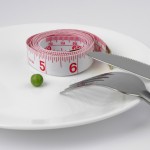When I returned home on September ninth from a twenty-eight-day trip, I found stacks of mail, magazines and newspapers plus about 650 emails to wade through. Most got short shrift and the old papers were pitched. But then I found four editions of JAMA and started reading selected articles. Over the years I've deplored the menagerie of fad diets that have been described, advertised and exploited for profit.
So coming upon a Viewpoint piece in the Aug 21, 2013 edition, I read with intense interest "A Call for an end to the Diet Debates." The pair of PhDs who authored the two-page discussion, Sherry L. Pagoto and Bradley M. Appelhans, are both academics, serving on the faculty of major medical schools. They commented on the host of studies and four recent meta-analyses that have reviewed the results of a variety of diets varying the amount of protein, carbohydrates and fats one is allowed.
Their conclusion is they don't differ in their results in any significant way and that sticking to a diet and adding exercise is what counts.
There's a second comment that was striking: in spite of markedly increased percentages of US adults being overweight or obese, the chances of their getting any counseling on the issue when they see their primary care physician have fallen. Researchers from the Penn State College of Medicine published an article in February of this year titled "A silent response to the obesity epidemic: decline in US physician weight counseling." The National Center for Biotechnology, a National Library of Medicine section, published a short version of this study comparing outpatient visits in 1995-1996 to those in 2007-2008 (the most recent data available from an ongoing national ambulatory medical care survey).
What I think this means is that we still don't pay physicians enough for preventive medicine interventions; we pay much more for procedures, what I think of as "Catch-up Medicine."
Over the past forty-seven years, ever since I graduated from medical school in 1966, I've seen a host of fad diets come and go. The Rice Diet, invented at Duke where I served as an intern and resident, is still around, but was originally utilized as a very-low-protein approach for patents with severe kidney disease. Since then we've seen high protein, low protein, several that focus on carbohydrates, and, this year, in a blog from a Phoenix newspaper, an entertaining look at "5 Fad Diets to Avoid in 2013."
Those include: a gluten-free diet (reasonable only for those who actually have been diagnosed, preferably by an experienced physician, as having gluten intolerance); the Dukan Diet (I'll supply a link to the WebMD review of this French approach), essentially a high-protein and limited calorie approach that may work short-term, but doesn't supply a balanced diet for the years to come; the alkaline diet (here's another review from WebMD) which claims to alter your blood pH, which is nonsense, but basically is a fresh fruit and vegetable plus hydration approach which in itself isn't unreasonable for those who don't have kidney disease or severe diabetes. But the components of this diet can easily be purchased in your supermarket and therefore don't need to be obtained through a website; the HCG diet, dangerously restrictive in calories and supplying a hormone that ought to be used only by a physician's prescription, usually for fertility issues (here's a Mayo Clinic review that says the diet dangerous); and finally, the beef tapeworm diet where some go over our southern border and actually pay to be infected with a parasitic disease. I don't feel the need to even comment on the logic of that approach.
So what does make sense to me is, as always, eating less and doing more.
Of course that's not as easy as it sounds. Some of my previous posts have alluded to the ways I've made this work for me, but you may or may not find them to fit your own lifestyle.
So I'd suggest the following: 1). Don't fall for the expensive fad diet ploy; eat in whatever pattern suits you (three meals a day is my habitual approach, but I sometimes eat two with a medium-sized brunch in anticipation of an evening event that includes food in abundance), but avoid snacking and late evening binges; 2) Eat balanced meals with more fruits and vegetables and less (or no) red meat than is typical for many Americans; 3). Find a form of exercise that you're comfortable with and do it almost every day (We walk an hour a day and I spend another hour or often two in the gym six days a week; that may not work for you, especially if you have a full-time job.); 4). Don't beat yourself up when you fall off your eating and exercise (figurative) bike, but get back on it ASAP. 5). Weigh yourself daily on a good scale, at the same time of day, wearing nothing (or as little as possible) and keep a record of your weight. 6). Don't expect to lose twenty-five pounds in a few weeks. If you did that, my bet is you'd gain it all back in a year. Aim for a pound a week.
I took my eating plan, which I first decided on in 1996 or 1997, and really started using in early 2009, and wrote down all of the ideas and some recipes my wife added; I ended up with a 50,000 word book that I may eventually try to polish enough to publish. There are a number of specifics that I've added to the six basics concepts in the paragraph above, but I'll mention those at another time.
I still occasionally struggle with one aspect of my eating plan; late-night reading can be a prelude to minor binging. And events with food are another potential minefield. But I've managed to get back to my diet whenever I'm above what I consider to be my acceptable range.
So I have four by six inch cards that tell me: "Don"t snack at events."
I'll bring one along tonight when I go to a writers' meeting; there will be two speakers, but someone is bound to have lots of snacks for the group.
I don't plan to eat them.
Tags: Exercise, Fad diets, sensible weight loss, weight loss, weight-management counseling


